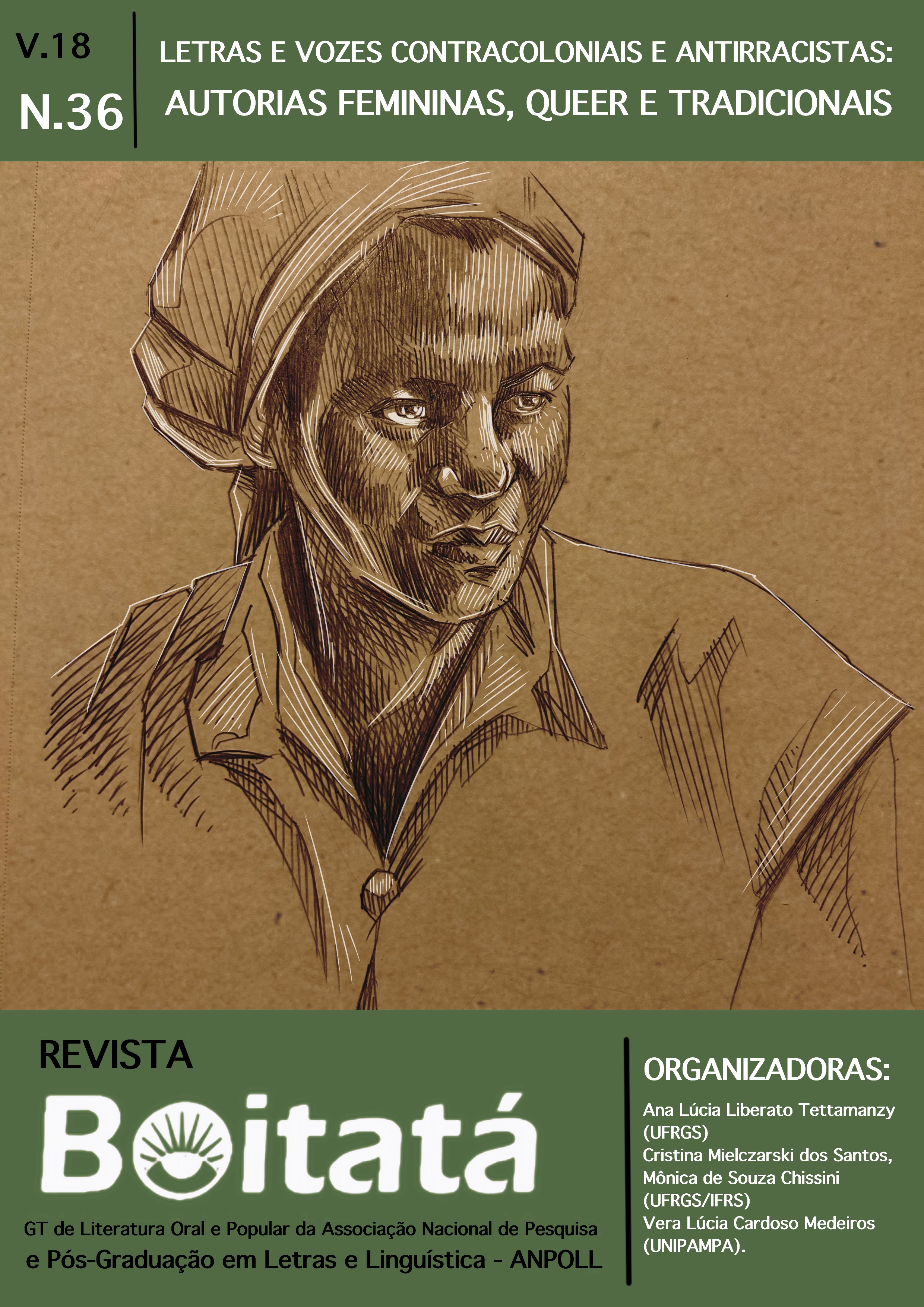The Indigenous Identity
Memory and Resistance in Eliane Potiguara's Writing
DOI:
https://doi.org/10.5433/boitata.2023v18.e47973Keywords:
Eliane Potiguara, indigenous identities, memoryAbstract
This article is an analysis of the work of the indigenous writer Eliane Potiguara, Half face, Half mask (2019) in light of postcolonail theories and the indigenous identity. The approach favors the representation of indigenous women in Potiguara Literature, the collective voice of Brazilian indigenous peoples, gender, race and the struggle for territory of the original inhabitants of Brazil. The countercolonial lyrics and voices of indigenous women are a permanent anti racista manifesto from the oral memory of the elderly to the writings that reach the classrooms, educating for the respect for Mother Earth and her dissident bodies-territories. With the theoretical instrumentation of the Black skins, White masks (2008) by Frantz Fanon, I analyze the split identities of the "red skin, white masks" resulting from the anti-indigenous racism of the neocolonizers; and the decolonial pedagogies that envision several worlds and various forms of knowledge such as the thought of Lorena Cabnal, Community Feminism (2018) which brings together Latin American women, inhabitants from Abya Yala : indigenous, black, mestizo women, identities violated since the 16th century by patriarchy, white, christian and capitalist. Indigenous Literature is an area of knwolwdge that makes all of us aware of the urgency of defending our nature and all of the peoples who fight for its preservation
Downloads
References
ALENCAR, J. Iracema. 2. ed. Rio de Janeiro: Ediouro, 1999.
ANDRADE, M. Macunaíma: herói sem nenhum caráter. São Paulo: Oficinas Gráficas de Eugênio Cupolo, 1928.
BRASIL. Lei n. 11.645, de 10 de março de 2008. Altera a lei no 9.394, de 20 de dezembro de 1996, modificada pela lei no 10.639, de 9 de janeiro de 2003, que estabelece as diretrizes e bases da educação nacional, para incluir no currículo oficial da rede de ensino a obrigatoriedade da temática "história e cultura afro-brasileira e indígena". Brasília, DF:
Presidência da República, 2008. Disponível em: http://www.planalto.gov.br/ccivil_03/_ato2007-2010/2008/lei/l11645.htm. Acesso em: 16 abr. 2023.
CABNAL, L. Defender o território-terra e não defender o território-corpo das mulheres é uma incoerência política. In: LIMA, A. A.; JUSTO, M.; PRAÇA, M. (org.). Outras economias: alternativas ao capitalismo e ao atual modelo de desenvolvimento. Rio de Janeiro: Instituto Políticas Alternativas para o Cone Sul, 2018. p. 23-28.
CUNHA, M. C. Índios no Brasil: história, direitos e cidadania. São Paulo: Claro Enigma, 2012.
ESTÉS, C. P. Mulheres que correm com lobos: mitos e histórias do arquétipo da mulher selvagem. Rio de Janeiro: Rocco, 1994.
FANON, F. Em defesa da revolução africana. Lisboa: Sá da Costa, 1980.
FANON, F. Os condenados da terra. Juiz de Fora: Editora UFJF, 2005.
FANON, F. Peles negras, máscaras brancas. Salvador: EDFBA, 2008.
FARACO, C. E. Práticas de língua portuguesa. São Paulo: Saraiva Educação, 2020.
KRENAK, A. Apresentação In: POTIGUARA, E. Metade cara, metade máscara. 3. ed.[Rio de Janeiro]: Grumin, 2019. p.11-12.
NIMUENDAJU, C. Mapa etno-histórico do Brasil e regiões adjacentes. Belém: [s. l.],1994. 1 mapa, escala 1:2.500.000. Disponível em: http://mapa-nimuendaju.eita.coop.br/.Acesso em: 16 abr. 2023.
POTIGUARA, E. Metade cara, metade máscara. 3. Ed. [Rio de Janeiro]: Grumin, 2019
POTIGUARA. Potiguara. Povos Indígenas no Brasil, São Paulo, 25 jan. 2021. Disponível em: https://pib.socioambiental.org/pt/Povo:Potiguara. Acesso em: 16 abr. 2023.
SANTOS, A. P. F. Os contos de Conceição Evaristo e a representação da mulher negra: diáspora, gênero e descolonização. 2021. Dissertação (Mestrado em Letras) - Instituto de Letras, Universidade Federal do Rio Grande do Sul, Porto Alegre, 2021. Disponível em:https://lume.ufrgs.br/handle/10183/225930. Acesso em: 16 abr. 2023.
Downloads
Published
How to Cite
Issue
Section
License
Copyright (c) 2024 Ana Paula Freitas dos Santos

This work is licensed under a Creative Commons Attribution 4.0 International License.
Boitatá esta licenciada com CC BY sob essa licença é possível: Compartilhar - copiar e redistribuir o material em qualquer suporte ou formato. Adaptar - remixar, transformar, e criar a partir do material, atribuindo o devido crédito e prover um link para a licença e indicar se mudanças foram feitas.






















